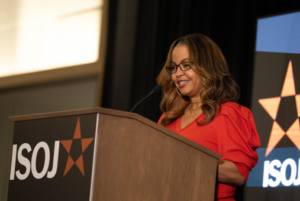
Wendi C. Thomas founded MLK50: Justice through Journalism in 2017. (Patricia Lim/Knight Center)
Wendi C. Thomas, founding editor and publisher of nonprofit newspaper MLK50: Justice through Journalism, created a newsroom that centered “people traditionally pushed to the margins.”
During her keynote session at the 25th International Symposium on Online Journalism (ISOJ), on April 12, Thomas told that story in a discussion moderated by Emily Ramshaw, co-founder and CEO of The 19th*.
MLK50, founded originally in 2017 as a one-year project, focuses on addressing critical issues in Memphis, Tennessee. Thomas said she conceived of MLK50 in 2008 while coordinating coverage of the 50th anniversary of Dr. Martin Luther King Jr.’s assassinaton for the Daily Paper in Memphis.
“The research I did during that project was really sobering,” Thomas said. “That's when I realized that the only kind of journalism I wanted to do, the only kind of journalism that was important to me was journalism that centers the people who have been pushed to the margins.”
But that kind of journalism wasn’t possible with a legacy newspaper, she said.
“I used to think that legacy newsrooms could be reformed – a little change here, a few more Black decision makers there, but I don't think that anymore,” Thomas said. “I think to do justice to journalism requires you to completely reimagine what a newsroom is and what it could be.”
The onus to bring MLK50 to life came in 2014 when Thomas was harassed and threatened after writing columns in the Daily Paper in Memphis, calling for the removal of Confederate monuments.
“Most distressingly, newsroom leadership didn't seem to take my security concerns seriously, and I didn't feel supported. It ended up being one of the most distressing seasons of my professional career,” Thomas said. “But it ended up being one of the best things to ever happen to me.”
Thomas said she took that opportunity to create a newsroom that would allow her to do the journalism that she believed could be possible.
“This newsroom I was dreaming of would be led by people of color,” Thomas said. “It would center the people traditionally pushed to the margins because of their race or sexual orientation or gender identity or immigration status.”
Her dream involved a newsroom that represented the people it served — two-third of Memphis residents are Black and over 50% are women, Thomas said.
“Our team of intrepid journalists would hold the powerful accountable,” Thomas said. We would celebrate joy, especially Black joy, which is important because a lot of the topics we cover are pretty heavy. We would be the newsroom that I'd always wanted to work in.”
Thomas said her newsroom would pay contributors fairly and quickly, avoid working on weekends, provide generous benefits and encourage a healthy work-life balance.
In 2017, Thomas took a Harvard entrepreneurship class and completed her final project on her dream newsroom, detailing her budget analysis and business plan.
“I submitted that project and anxiously awaited my professor’s response,” Thomas said. “My idea, he told me, was not viable. It was like a gut punch.”
But Thomas didn’t let those words stop her, she said. She sought advice from one of her other professors, and he encouraged her that the idea was both possible and necessary.
One year before the 50th anniversary of Dr. Martin Luther King’s death, Thomas began to turn her dream into reality. She had no funding, entrepreneurial experience or connections, she said.
The first several years were a financial struggle, Thomas said. She was doing things she had no training for – hiring freelancers, approving invoices, writing grant applications and connecting with funders.
“It's hard to be a Black woman with ambition, to shrug off the heaviest doubt and to steady yourself after someone who has been deemed an expert says your idea won't work,” Thomas said. “I encouraged myself. Sometimes I still wanted to throw in the towel, but I remembered the commitment I'd made to Memphis, the place I’d called home for one half of my life.”
Thomas said she was over the moon when her paper received their first $100,000 donation, and the money began to flow in after that.
“Surely, slowly, we were producing the kind of journalism I hoped for,” Thomas said. “Gradually over the last seven years, much of my vision has come to fruition. We went from a ragtag team of freelancers to a staff of 10 and we're hiring four more this year.”
Thomas said MLK50’s budget has skyrocketed to $2.4 million since the first year.
“My team has really taken my dream to the next level and I’m excited about what they’re going to develop as we step into this seventh chapter,” Thomas said. “But I'll leave you with one last affirmation. Set goals so big they laugh. Crush them while they watch.”
ISOJ is a global online journalism conference organized by the Knight Center for Journalism in the Americas at the University of Texas at Austin. In 2024, it is celebrating 25 years of bringing together journalists, media executives and scholars to discuss the impact of the digital revolution on journalism.